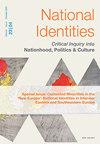The right of blood: ‘ethnically’ selective citizenship policies in Europe
IF 0.9
Q3 POLITICAL SCIENCE
引用次数: 3
Abstract
ABSTRACT This paper explores citizenship policies in Europe with the aim of testing the salience of the ethnic–civic binary distinction. The paper starts with an overview of the existing typologies of citizenship regimes, with a special emphasis on the civic–ethnic dichotomy. After a brief assessment of different types of selective acquisition policies in the EU, the paper discusses the emerging normative legal framework of citizenship attribution in Europe. The paper shows that the Europeanization of citizenship acquisition norms legitimizes, if not encourages, selectivity in the case of non-resident ethnic kin populations. It is also argued that due to the ambiguous international legal coding, preferential naturalization allows ethnonationalist governments to strengthen the symbolic claims of the titular national groups over the state. But quite paradoxically, these ethnically framed policies in practice often open up the possibility of the facilitated naturalization for individuals who can hardly be considered ‘co-ethnics’ in the thick sociocultural sense of the word. Therefore, ethnonationalist political projects that emphasize the importance the ‘right of blood’ may lead to the naturalization of individuals who have very weak cultural or linguistic ties to their putative ‘homelands’. Thus, ethnically framed citizenship policies may water down ethnic homogeneity rather than strengthening it.血统的权利:欧洲的“种族”选择性公民政策
本文探讨了欧洲的公民政策,目的是检验种族-公民二元区分的显著性。本文首先概述了现有公民制度的类型学,特别强调了公民-民族二分法。在对欧盟不同类型的选择性取得政策进行简要评估后,本文讨论了欧洲公民身份归属的规范性法律框架。本文表明,公民身份获取规范的欧洲化,即使没有鼓励,也使非常住族裔亲属群体的选择性合法化。也有人认为,由于模棱两可的国际法律编码,优先归化允许民族民族主义政府加强名义上的民族群体对国家的象征性要求。但相当矛盾的是,这些以种族为框架的政策在实践中往往为那些在浓重的社会文化意义上很难被视为“同种族”的个人提供了便利入籍的可能性。因此,强调“血缘权利”重要性的民族主义政治计划可能导致那些与假定的“祖国”有着非常微弱的文化或语言联系的个人入籍。因此,以种族为框架的公民政策可能会淡化而不是加强种族同质性。
本文章由计算机程序翻译,如有差异,请以英文原文为准。
求助全文
约1分钟内获得全文
求助全文
来源期刊

NATIONAL IDENTITIES
POLITICAL SCIENCE-
CiteScore
1.70
自引率
0.00%
发文量
37
期刊介绍:
National Identities explores the formation and expression of national identity from antiquity to the present day. It examines the role in forging identity of cultural (language, architecture, music, gender, religion, the media, sport, encounters with "the other" etc.) and political (state forms, wars, boundaries) factors, by examining how these have been shaped and changed over time. The historical significance of "nation"in political and cultural terms is considered in relationship to other important and in some cases countervailing forms of identity such as religion, region, tribe or class. The focus is on identity, rather than on contingent political forms that may express it. The journal is not prescriptive or proscriptive in its approach.
 求助内容:
求助内容: 应助结果提醒方式:
应助结果提醒方式:


